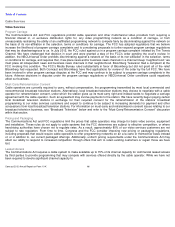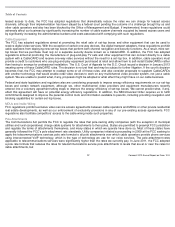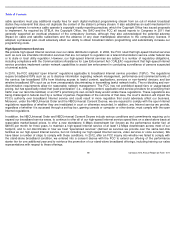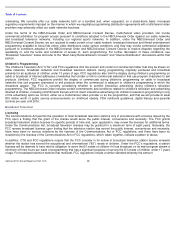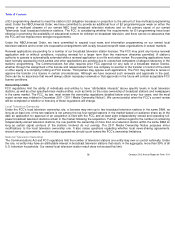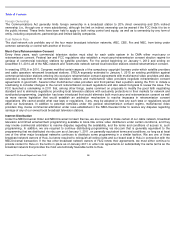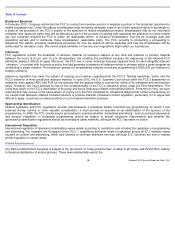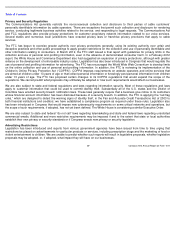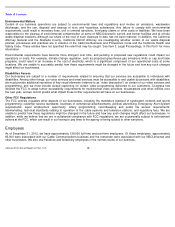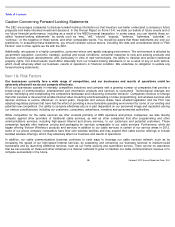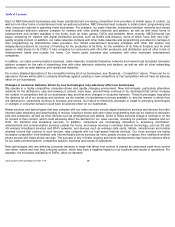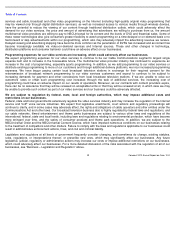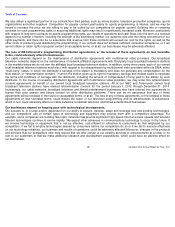Comcast 2012 Annual Report Download - page 27
Download and view the complete annual report
Please find page 27 of the 2012 Comcast annual report below. You can navigate through the pages in the report by either clicking on the pages listed below, or by using the keyword search tool below to find specific information within the annual report.
Table of Contents
Foreign Ownership
The Communications Act generally limits foreign ownership in a broadcast station to 20% direct ownership and 25% indirect
ownership (i.e., through one or more subsidiaries), although the limit on indirect ownership can be waived if the FCC finds it to be in
the public interest. These limits have been held to apply to both voting control and equity, as well as to ownership by any form of
entity, including corporations, partnerships and limited liability companies.
Dual Network Rule
The dual network rule prohibits any of the four major broadcast television networks, ABC, CBS, Fox and NBC, from being under
common ownership or control with another of the four.
Must-Carry/Retransmission Consent
Every three years, each commercial television station must elect for each cable system in its DMA either must-
carry or
retransmission consent. Federal law and FCC regulations also establish a must-
carry/retransmission consent election regime for
carriage of commercial television stations by satellite providers. For the period beginning on January 1, 2012 and ending on
December 31, 2014, all of the NBC network and Telemundo network owned local television stations elected retransmission consent.
In enacting STELA in 2010, Congress modified certain aspects of the compulsory copyright licenses under which satellite providers
and cable operators retransmit broadcast stations. STELA expressly extended to January 1, 2015 an existing prohibition against
commercial television stations entering into exclusive retransmission consent agreements with multichannel video providers and also
extended a requirement that commercial television stations and multichannel video providers negotiate retransmission consent
agreements in good faith. Several other multichannel video providers and third parties filed a petition asking the FCC to initiate a
rulemaking to consider changes to the current retransmission consent regulations and also asked Congress to review the issue. The
FCC launched a rulemaking in 2011 that, among other things, seeks comment on proposals to modify the good faith negotiating
standard and to eliminate regulations providing local television stations with exclusivity protections in their markets for network and
syndicated programming. Legislation has been introduced that would eliminate both must-
carry and retransmission consent as well
as more narrow legislation that would establish an arbitration mechanism to resolve impasses in retransmission consent
negotiations. We cannot predict what new laws or regulations, if any, may be adopted or how any such laws or regulations would
affect our businesses. In addition to potential remedies under the general retransmission consent regime, multichannel video
providers may invoke commercial arbitration under rules established in the NBCUniversal Order to resolve any disputes regarding
carriage of any of our owned local broadcast television stations.
Internet Distribution
Under the NBCUniversal Order and NBCUniversal Consent Decree, we are required to make certain of our cable network, broadcast
television and filmed entertainment programming available to bona fide online video distributors under certain conditions, and they
may invoke commercial arbitration to resolve disputes regarding the availability, and the terms and conditions of access to, such
programming. In addition, we are required to continue distributing programming via nbc.com that is generally equivalent to the
programming that we distributed via nbc.com as of January 1, 2011, on generally equivalent terms and conditions, so long as at least
one of the other major broadcast networks continues to distribute some programming in a similar fashion. We are one of three
broadcast network owners of Hulu, but were required to relinquish all voting rights and our board seat in Hulu in connection with the
NBCUniversal transaction. If the two other broadcast network owners of Hulu renew their agreements, we must either continue to
provide content to Hulu on the terms in place as of January 2011 or enter into agreements on substantially the same terms as the
broadcast network that provides the most economically favorable terms to Hulu.
Comcast 2012 Annual Report on Form 10-K
24




